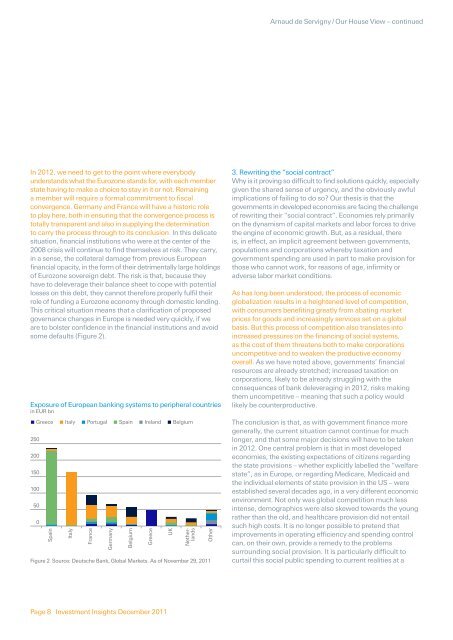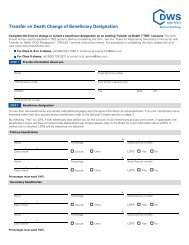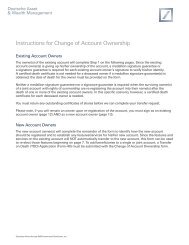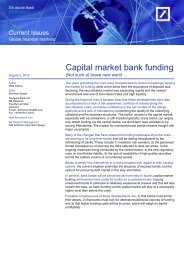Investment Insights Dezember 2011 - DWS Investments
Investment Insights Dezember 2011 - DWS Investments
Investment Insights Dezember 2011 - DWS Investments
Create successful ePaper yourself
Turn your PDF publications into a flip-book with our unique Google optimized e-Paper software.
Arnaud de Servigny / Our House View – continuedIn 2012, we need to get to the point where everybodyunderstands what the Eurozone stands for, with each memberstate having to make a choice to stay in it or not. Remaininga member will require a formal commitment to fiscalconvergence. Germany and France will have a historic roleto play here, both in ensuring that the convergence process istotally transparent and also in supplying the determinationto carry the process through to its conclusion. In this delicatesituation, financial institutions who were at the center of the2008 crisis will continue to find themselves at risk. They carry,in a sense, the collateral damage from previous Europeanfinancial opacity, in the form of their detrimentally large holdingsof Eurozone sovereign debt. The risk is that, because theyhave to deleverage their balance sheet to cope with potentiallosses on this debt, they cannot therefore properly fulfil theirrole of funding a Eurozone economy through domestic lending.This critical situation means that a clarification of proposedgovernance changes in Europe is needed very quickly, if weare to bolster confidence in the financial institutions and avoidsome defaults (Figure 2).Exposure of European banking systems to peripheral countriesin EUR bn250200150100Greece Italy Portugal Spain Ireland Belgium500SpainItalyFranceGermanyBelgiumGreeceUKNetherlandsFigure 2 Source: Deutsche Bank, Global Markets. As of November 29, <strong>2011</strong>Other3. Rewriting the “social contract”Why is it proving so difficult to find solutions quickly, especiallygiven the shared sense of urgency, and the obviously awfulimplications of failing to do so? Our thesis is that thegovernments in developed economies are facing the challengeof rewriting their “social contract”. Economies rely primarilyon the dynamism of capital markets and labor forces to drivethe engine of economic growth. But, as a residual, thereis, in effect, an implicit agreement between governments,populations and corporations whereby taxation andgovernment spending are used in part to make provision forthose who cannot work, for reasons of age, infirmity oradverse labor market conditions.As has long been understood, the process of economicglobalization results in a heightened level of competition,with consumers benefiting greatly from abating marketprices for goods and increasingly services set on a globalbasis. But this process of competition also translates intoincreased pressures on the financing of social systems,as the cost of them threatens both to make corporationsuncompetitive and to weaken the productive economyoverall. As we have noted above, governments’ financialresources are already stretched; increased taxation oncorporations, likely to be already struggling with theconsequences of bank deleveraging in 2012, risks makingthem uncompetitive – meaning that such a policy wouldlikely be counterproductive.The conclusion is that, as with government finance moregenerally, the current situation cannot continue for muchlonger, and that some major decisions will have to be takenin 2012. One central problem is that in most developedeconomies, the existing expectations of citizens regardingthe state provisions – whether explicitly labelled the “welfarestate”, as in Europe, or regarding Medicare, Medicaid andthe individual elements of state provision in the US – wereestablished several decades ago, in a very different economicenvironment. Not only was global competition much lessintense, demographics were also skewed towards the youngrather than the old, and healthcare provision did not entailsuch high costs. It is no longer possible to pretend thatimprovements in operating efficiency and spending controlcan, on their own, provide a remedy to the problemssurrounding social provision. It is particularly difficult tocurtail this social public spending to current realities at aPage 8 <strong>Investment</strong> <strong>Insights</strong> December <strong>2011</strong>
















